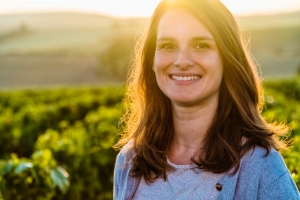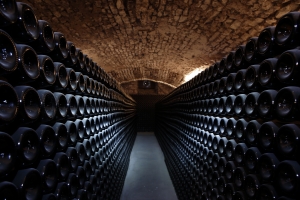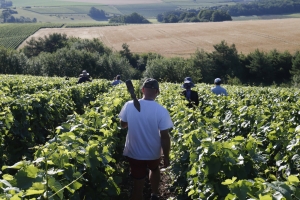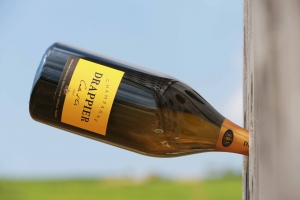-
A Friday Chat With Charline Drappier
22 October 2021Hi Charline, thanks so much for speaking to us.

Could you start by telling us a little bit about the background of Drappier Champagne and your family’s business?
My family has been farming vineyards for 8 generations in the tiny village of Urville, located in the south-eastern part of Champagne (in the Aube). My grandparents started to produce their own Champagne after World War II, something that was quite uncommon in the Aube. Today, my brothers and I are happy to work along with our parents and grandfather. A truly family estate!
What’s so unique about your Champagne-making methods?
Our history and geography both focus on pinot noir, and older (ancient) varieties. We have the privilege to mainly source our grapes from our own vineyards. There is definitely a sense of place based on the Kimmeridgian limestone terroir of Urville. My father was a pioneer in making no dosage, no sulphite Champagne a couple of decades ago.
And tell us about Antoine using horses to work the land – what’s the reasoning behind this?
The first reason is: he loves it! Antoine has always been passionate about working with all kinds of animals (which now include sheep and hens). When he was 14, he started to train with a vineyard horse specialist, guiding them through the vines to accomplish different soil work: surface ploughing, etc. Not only does it help us to reduce the use of tractors, but also it prevents erosion and helps working closer to the plant.

What impact does being organic have on the Champagne in terms of quality and flavour?
Because yields tend to be smaller on organic viticulture (productivity is not pushed by any chemicals), we tend to observe a higher concentration of flavours in the grapes. However, this is subjective and can vary from one year to another, and it’s important to remember that organic isn’t always a synonym of quality wine. It all depends on the grower’s attention to the vineyard.
Why are sustainable business practice and the environment so very important to you and your family?
Working with our natural environment is such a big part of our everyday job, that we observe changes in a very concrete way. Not only climate changes, but also the impact of abuse of chemicals, etc. It was obvious for my father Michel that in the 1990s, he would try to express terroirs in the cleanest way possible. It started in the vines but extended to wine-making choices: low sulphur, low dosage, making ourselves everything we could (including our own liqueur de dosage or yeasts). It plays a central role in any decision we make.

And how did you become the first carbon-neutral estate in the region in 2016?
Often, sustainability in the wine world equals organic agriculture. But we can go much further than organic farming, when it comes to reducing our impact on the environment. Given that the greenhouse effect is obvious in Champagne, carbon emissions have been one of our focuses for many years. We installed what was the largest winery under photovoltaic panels in 2006, and have kept expanding our solar energy production. Today, we produce 75% of the electricity we need, part of which is used to charge our electric vehicles and tractors. There is Zero fossil energy being utilized at Drappier.
Do you like to think of Champagne as something to drink every day or to save for celebrations?
Well both! We open Champagnes like we open a good bottle of wine. But given Champagne a bit more thought when tasting it is definitely a good thing to do, especially provided all the efforts we put inside the bottle. But on top of that, because of its “joyful” character, it can also bring happiness after a bad day.
What about pairing Champagne with food – what are your favourite dishes to drink it with?
I would say that Champagne is actually the most versatile type of wine to pair with food. Except for a few exceptions, it goes well with many different cuisines. My most recent discovery, which struck me as a surprise, was Beef tartare and Brut Nature. The protein-feel of raw meat, yet delicate flavour pairs very well with a well-structured (pinot noir based), and dry Champagne.

What glassware do you suggest serving Drappier in? Flutes or coupes?
Neither nor! A glass for wine is perfect. The ideal shape, in my opinion, is a “pointy” shape of a wine glass, it has the “width” to express aromas, but a narrow bottom to help effervescence.
What about magnums and large format bottles – are they just for show or do they change the product?
In our case, we made a choice to do the “prise de mousse” inside each large format: up until a 30L bottle! I believe it’s unique in Champagne. This way, we could see the effect of fermenting in a larger format, reducing oxidation effect and glass contact. The wine is very fresh and can be kept longer.
How long have you been working with Searcys? Tell us a bit about your relationship with the company.
It has been over 10 years! We were lucky that Searcys acknowledged our “style” of Champagne at this time. Offering one of the finest Champagne selection in the country, it was an honour, that progressively turned into a solid collaboration: Searcys has been serving our Champagne by the glass for 3 years, I believe. Thank you!
What is your favourite dish from the British Isles you can pair with Drappier Champagne?
The Sunday roast! Champagne is absolutely delicious with a crispy and roasted turkey, and baked potatoes. Vintage Champagne is a perfect option.
Although more classic as a pairing, Dover sole is fantastic when cooked “meunière” with a Chardonnay-based Champagne.
What is your favourite London landmark and why?
The Tate Britain, I absolutely love this museum. I first visited when I was only a teenager, and I became an admirer of Turner. I always come back for their collection and exhibitions. On a very different note, I love wandering around Camden because of its “quirky British” vibe, and it’s very uncommon feeling.
What does heritage and indulgence mean for you and your business?
For me, heritage means finding joy and happiness in the small things of life. It is a matter of immense pride to take our 95-year-old grandfather to the vineyards he planted 50 years ago that are now thriving under the care of his son and grandchildren. Sometimes, it is tough, hard work. But the joy that Champagne and family bring is limitless. The weight of family heritage is real, it is also what makes our passion meaningful, and Champagne makes this weight much lighter. Who can complain about ending the day with a glass of Champagne surrounded by all your family?
- ABOUT SEARCYS
- About Searcys
- News
- All News
- Searcys x Sociability Blog
- Raise a Glass: Celebrate English Wine Week with Searcys
- a Day of Insight and Impact at the ESG Forum at 116 Pall Mall
- Searcys and the Barbican host isla’s “Made Possible Festival” A One-Stop Event Sustainability Summit
- Plan the Ultimate Summer Soirée with Our Spectacular London Venues
- Private Dining Now Available at the Barbican Conservatory
- A Fresh Taste of Artful Hospitality at the National Gallery
- Reservations open for Locatelli
- The Business of Events: A Westminster Dinner to Remember
- Restaurants and Bars
- Event Venues
- EVENT SPACES
- All Locations
- {10-11} Carlton House Terrace
- 30 Euston Square
- 41 Portland Place
- 116 Pall Mall
- Barber-Surgeons Hall
- Battersea Power Station
- Carpenters’ Hall
- Church House
- Gray’s Inn
- Horizon 22
- IET London: Savoy Place
- National Army Museum
- No. 11 Cavendish Square
- One Moorgate Place
- Saddlers’ Hall
- Searcys at The Gherkin
- EVENT SPACES cont.
- Searcys Bar and Brasserie at Surveyors House
- Stationers’ Hall
- St Pancras Bar & Brasserie
- Surveyors House
- The Barbican
- The HAC
- The Inner Temple
- The Portrait Restaurant By Richard Corrigan
- The Roman Baths and Pump Room
- The Royal Institution
- The View, Royal College of Surgeons of England
- Vintners’ Hall
- Event Types
- SEARCYS ROLLS-ROYCE
- Let Us Find Your Venue
- Event Catering
- What’s On
- Contact Us
- ABOUT SEARCYS
- About Searcys
- News
- All News
- Searcys x Sociability Blog
- Raise a Glass: Celebrate English Wine Week with Searcys
- a Day of Insight and Impact at the ESG Forum at 116 Pall Mall
- Searcys and the Barbican host isla’s “Made Possible Festival” A One-Stop Event Sustainability Summit
- Plan the Ultimate Summer Soirée with Our Spectacular London Venues
- Private Dining Now Available at the Barbican Conservatory
- A Fresh Taste of Artful Hospitality at the National Gallery
- Reservations open for Locatelli
- The Business of Events: A Westminster Dinner to Remember
- Restaurants and Bars
- Event Venues
- EVENT SPACES
- All Locations
- {10-11} Carlton House Terrace
- 30 Euston Square
- 41 Portland Place
- 116 Pall Mall
- Barber-Surgeons Hall
- Battersea Power Station
- Carpenters’ Hall
- Church House
- Gray’s Inn
- Horizon 22
- IET London: Savoy Place
- National Army Museum
- No. 11 Cavendish Square
- One Moorgate Place
- Saddlers’ Hall
- Searcys at The Gherkin
- EVENT SPACES cont.
- Searcys Bar and Brasserie at Surveyors House
- Stationers’ Hall
- St Pancras Bar & Brasserie
- Surveyors House
- The Barbican
- The HAC
- The Inner Temple
- The Portrait Restaurant By Richard Corrigan
- The Roman Baths and Pump Room
- The Royal Institution
- The View, Royal College of Surgeons of England
- Vintners’ Hall
- Event Types
- SEARCYS ROLLS-ROYCE
- Let Us Find Your Venue
- Event Catering
- What’s On
- Contact Us
Saved Venues0Stay Connected with Searcys
Sign up to receive updates on exclusive events, restaurant offers, and more from Searcys.


